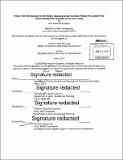Fringe town : revitalization on the margin, assessing small downtown revival and catalytic real estate development feasibility on the urban fringe
Author(s)
Goodwin, Paul Matthew
DownloadFull printable version (25.18Mb)
Other Contributors
Massachusetts Institute of Technology. Center for Real Estate. Program in Real Estate Development.
Advisor
Karl Seidman.
Terms of use
Metadata
Show full item recordAbstract
This thesis has sought to construct a diagnostic study of small downtown revitalization in Somersworth, New Hampshire, and Berwick, Maine. To develop a holistic understanding of downtown revitalization in Somersworth-Berwick, and other such small towns on the urban fringe, this research was divided into three broad parts: [1] local contextualization of Somersworth-Berwick and empirical studies of small town revitalization, [2] a local market analysis, and [3] a site plan and financial feasibility model. The methods used to complete this research included focused interviews, market analysis, and financial modeling. These methods are coupled with a review of literature and sought to answer what potential market-based downtown revitalization strategies are and how economically and financially viable these might be in the context of Somersworth-Berwick. While this thesis has fashioned a robust framework specifically in the context of Somersworth-Berwick's downtown revitalization, its methodological approach and findings are applicable for similar small and fringe communities. The findings of this thesis highlight that market-based revitalization efforts, such as catalytic real estate development, do hold promise in advancing revitalization efforts yet often require subsidy in the face of weak real estate markets and market failure. As such, broad-based and non-traditional revitalization efforts are key elements to a holistic and effective downtown revitalization plan.
Description
Thesis: M.C.P., Massachusetts Institute of Technology, Department of Urban Studies and Planning, 2015. Thesis: S.M. in Real Estate Development, Massachusetts Institute of Technology, Program in Real Estate Development in conjunction with the Center for Real Estate, 2015. Cataloged from PDF version of thesis. Includes bibliographical references (pages 120-122).
Date issued
2015Department
Massachusetts Institute of Technology. Center for Real Estate. Program in Real Estate Development.; Massachusetts Institute of Technology. Center for Real Estate; Massachusetts Institute of Technology. Department of Urban Studies and PlanningPublisher
Massachusetts Institute of Technology
Keywords
Urban Studies and Planning., Center for Real Estate. Program in Real Estate Development.